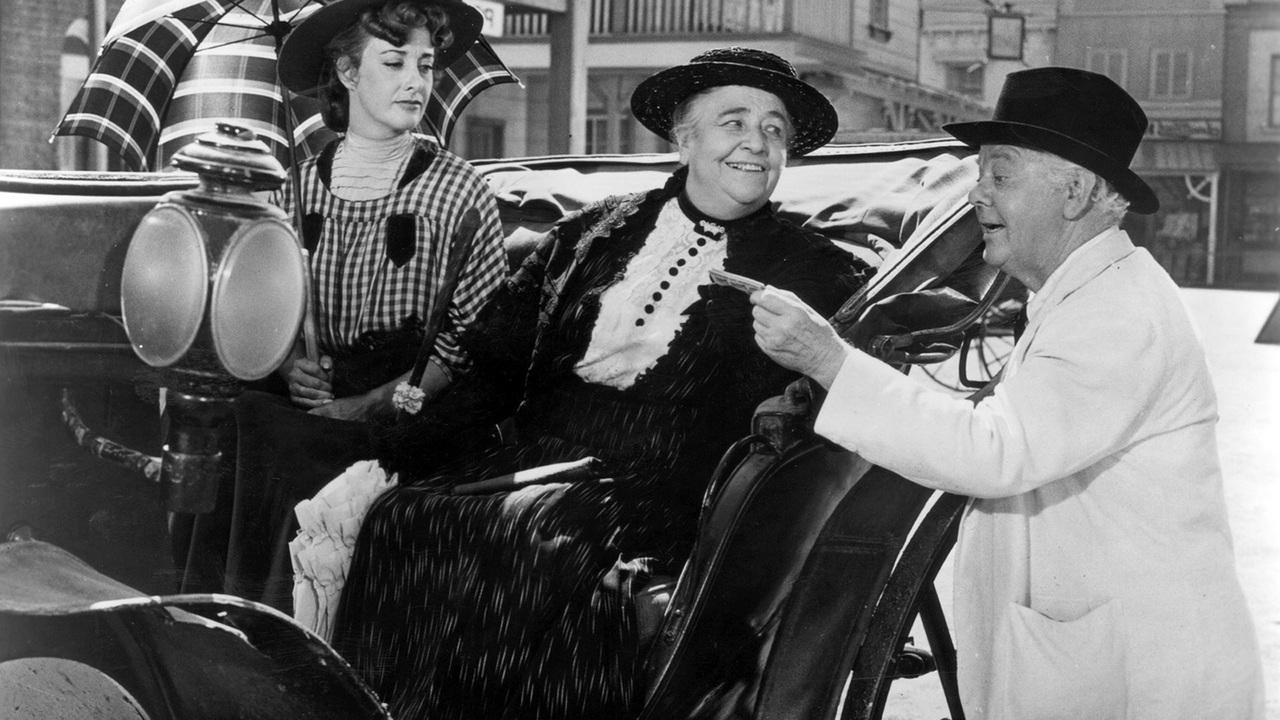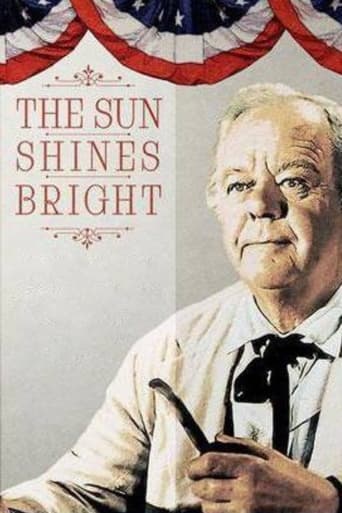

When a movie has you begging for it to end not even half way through it's pure crap. We've all seen this movie and this characters millions of times, nothing new in it. Don't waste your time.
... View MoreIf you're interested in the topic at hand, you should just watch it and judge yourself because the reviews have gone very biased by people that didn't even watch it and just hate (or love) the creator. I liked it, it was well written, narrated, and directed and it was about a topic that interests me.
... View MoreLet me be very fair here, this is not the best movie in my opinion. But, this movie is fun, it has purpose and is very enjoyable to watch.
... View MoreThis is a dark and sometimes deeply uncomfortable drama
... View More"The Sun Shines Bright" is an offensive portrait of the post-Civil War South and it's hard to imagine the film NOT offending anyone. Instead of showing real life in Kentucky, it's super-idealized to such a point that the film is ridiculous. The Confederate Civil War veterans get along just great with the Union vets (Kentucky was one of the few states that had folks fighting on both sides), the blacks are all extremely happy and life is grand. No matter that all this just isn't true and that blacks were treated, often, as subhuman. In the original film, "Judge Priest", Will Rogers played the Judge and his ever-present lazy, stupid black sidekick, Poindexter, was played by Stepin Fetchit. Rogers, however, had been killed long ago in a famous plane crash and here the character is played by Charles Winninger and Fetchit is back to play the same stupid and lazy guy-- something Fetchit did in many films back in the day when laughing at a stupid and lazy black man was considered the rage. But his subhuman characterization is more sad than anything else...and I cannot imagine folks today thinking it's funny.As for the stories in the film, they are all mildly interesting and they are engaging. You can tell it's a John Ford film even without a decent budget and fancy cast because it is highly sentimental. It also paints a portrait of what life SHOULD have been like--with the paternalistic white man looking out for their good little black children. It's odd, however, that the same racist director then went on to make "Sergeant Rutlidge" with Woody Strode--a film far ahead of its time and extremely sensitive to the dehumanization of black Americans. So would I recommend this film? Not really. It's certainly among the director's lesser movies and is so inaccurate a portrayal that the retired history teacher within me felt a bit sad as I watched. Not horrible...just not what life was ever like in Kentucky...ever.
... View MoreThat is the theme of this sentimental comedy/drama remake of John Ford's "Judge Priest" which he also directed, and which he also asked black comical character actor Stepin Fetchit to repeat his role of the slow-witted servant. Not much has changed in almost two decades, and in the case of Hollywood's treatment of black characters, this is on the same scale as "Gone With the Wind". Cheerful mammys, singing darkies, almost missing the days of slavery, and in the case of Stepin Fetchit, he actually sits in on one of the meetings of the aging confederate soldiers as their servant, not their equal. At the heart and soul of this flawed but entertaining film is Charles Winninger, taking on the role which Will Rogers had played years before. He's running for re-election and finds opposition for the first time in years against a ruthless opponent.This is a small-minded community with Jane Darwell as the town matriarch who greets each of the young ladies coming into a town dance with the same fake compliment of her being the bell of the ball. When an outcast from years before returns, the past of her illegitimate daughter (Arlene Judge) is threatened to be revealed, and this leads to Judge Priest standing up for decency over human judgments and the moral pointing of the finger. Yet, there are tons of stereotypical southern characters tossed into the mixture, especially the presence of two moonshine making hicks (one played by a young Slim Pickens), a typical "Negro spiritual", and a ton of dialog rolling off the tongues of holier than thou sweeter yet as dangerous as honey rolling off a hive filled with swarming bees. The return to the screen after a 20 year absence of Dorothy Jordan (as Judge's unfortunate dying mother) is of particular interest as even with little dialog, she breaks your heart just with her sadly pathetic presence.In spite of the bell of falsehoods this film rings, I can't dismiss it as a film I didn't enjoy, because it showed that even in one small way through Winninger's character, people were changing somewhat, even if the whole racist stereotypes and praising of a way of life that just could not continue to be grated somewhat on my nerves.
... View MoreJohn Ford had a fondness for The Sun Shines Bright. It's a beautiful tale of an honorable old man who even while facing a tough re-election for town judge refuses to be a hypocrite or play up to a lot of his town's hypocrites.The film was done before as Judge Priest with Will Rogers in the title role. As good as The Sun Shines Bright is, it would have been even better had John Ford not chosen to use Stepin Fetchit in the same part he had in the original film. Stepin Fetchit is, well Stepin Fetchit. Funny thing is that a whole lot of black players are used in this film and their roles are not as stereotypical as his is.Charles Winninger is every bit as good as Will Rogers in the lead. If you can imagine Captain Andy from Show Boat had he taken up the law instead of show business, you get some idea of what Judge William Pittman Priest is all about. Justice is blind in his courtroom, but it isn't deaf and dumb also. In Winninger's life as well as his courtroom.He's up for re-election in his small Kentucky county and he's got a hard fighting opponent in prosecutor Milburn Stone. Priest is a proud Confederate veteran, but he's not above saving an innocent black kid from a lynch mob.Nor is he above a little Christian charity when it comes to seeing a fallen woman who just came to town to see her daughter before she died given a proper funeral service. When no accredited minister will do the service, Winninger fills in at the pulpit and has some choice words taken from the parable about the woman caught in sin.My favorite scene in The Sun Shines Bright is the funeral procession for the same woman. Winninger is the head of the local United Confederate Veterans and Henry O'Neill is the head of the local Grand Army of the Republic chapter. They are friends and friendly rivals. Yet on that day Republican O'Neill and Democrat Winninger both lead the funeral procession. Too bad our Republicans and Democrats of today can't agree on some common values.How does this impact on Winninger's election? You'll have to watch the beautiful and poetic The Sun Shines Bright to find out.
... View MoreIt is a lovely film to watch. Archie Stout one of fords favorite cameraman, shot it. The last scene where Judge Priest is seen in the doorway echos the last scene in the Searchers. It is a film about loyalty, honor and redemption. But there are scenes where the black people of the town are shown to be childlike, and in awe of their white leaders. This marks the film as a product of a time long past. Some of the scenes of the black people are demeaning. But over all, Judge Preists sense of honor, his fairness to all, his sense of decency looms over the film. Ford makes Judge Priest (played by Charles Winninger in his best role) a heroic figure. But a figure that is isolated even in a crowd. A former bugler he is left to carry on the codes of honor and fairness that the old south thought it contained. People vote for him, return him to office year after year, yet he goes into his home alone. He is man out of his time. A man of the community but set apart from it by his strict adherence to his code. Some of the acting in the film is over acting. But the last fifteen minutes are lovely to watch.
... View More